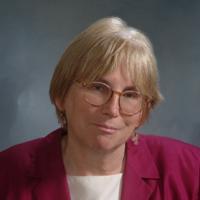
Identifying the role of DNA in the 1950s was the first step to a difficult cellular puzzle—how is DNA copied and repaired? JoAnne Stubbe pioneered many of the experiments to understand the complexities of this action, performed by RNA. She discovered that a careful use of free radicals—atoms with a missing electron that can destroy other molecules if left unchecked.is crucial to the process. By understanding the RNA to DNA conversion, Stubbe showed how anticancer drugs can check this transformation, inhibiting tumor growth when such conversion runs amok. This led to the design of a drug, gemcitabine, to treat pancreatic and other cancers. Stubbe accomplished such biological work by exploiting unique x-ray and spectroscopic experiments to watch the action of proteins and molecules on a cellular level.
Born in Champaign, Illinois, Stubbe earned her B.S. in chemistry from Penn in 1968. She went on to UC-Berkeley, earning her Ph.D. in 1971. Stubbe spent time at Williams, Brandeis, Yale, and the University of Wisconsin-Madison before arriving at MIT in 1987, where she continues to research and teach, as a professor of biology and the Novartis Professor of Chemistry.
Stubbe's work has regularly stood out not only because of her research breakthroughs, but also because of her creative use of physical methods to study biochemistry. In addition to her seminal studies of DNA synthesis by way of free radicals and enzymes known as ribonucleotide reductases, Stubbe has applied innovative imaging techniques to a host of other enzyme mechanics. For example, she explained how the antitumor antibiotic Bleomycin kills cancer cells by binding to and degrading DNA. She has also studied the mechanisms of DNA repair enzymes and cells' "suicide inhibitors" that inhibit certain enzyme functions. Stubbe has recently begun to examine how bacterial enzymes can be used to produce biodegradable plastics.
Stubbe's awards include the ICI-Stuart Pharmaceutical Award for Excellence in Chemistry, Texas A & M's F. A. Cotton Medal, the City of Philadelphia's John Scott Award, The Protein Society's Emil Thomas Kaiser Award, the NAS Award in Chemical Sciences, the National Medal of Science, as well as ACS's Pfizer Award in Enzyme Chemistry, Arthur C. Cope Scholar Award, Repligen Award, Alfred Bader Award in Bioinorganic or Bioorganic Chemistry, and Nakanishi Prize.
Information as of April 2010

